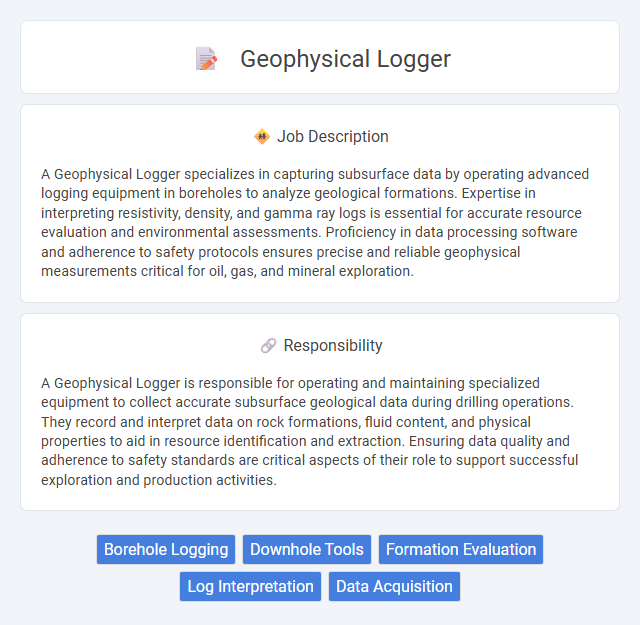
A Geophysical Logger specializes in capturing subsurface data by operating advanced logging equipment in boreholes to analyze geological formations. Expertise in interpreting resistivity, density, and gamma ray logs is essential for accurate resource evaluation and environmental assessments. Proficiency in data processing software and adherence to safety protocols ensures precise and reliable geophysical measurements critical for oil, gas, and mineral exploration.
Individuals with strong analytical skills and a keen interest in geology are likely to be suitable for a Geophysical Logger role. Those who are comfortable working in remote or challenging field conditions may find the job rewarding, while people with difficulties adapting to outdoor or physically demanding environments might struggle. A high level of attention to detail and the ability to interpret technical data probably increase the chances of success in this profession.
Qualification
A Geophysical Logger must hold a degree in geology, geophysics, or related earth sciences, combined with hands-on experience in logging tools and data interpretation. Proficiency in software like WellCAD, Spotfire, or similar logging analysis platforms is essential to accurately process and analyze subsurface geological data. Strong knowledge of borehole geophysics, formation evaluation techniques, and safety protocols ensures efficient field operations and data quality control.
Responsibility
A Geophysical Logger is responsible for operating and maintaining specialized equipment to collect accurate subsurface geological data during drilling operations. They record and interpret data on rock formations, fluid content, and physical properties to aid in resource identification and extraction. Ensuring data quality and adherence to safety standards are critical aspects of their role to support successful exploration and production activities.
Benefit
A Geophysical Logger job likely offers significant benefits such as gaining hands-on experience with advanced subsurface data acquisition technologies, which can enhance technical skills and career prospects in the geosciences field. The role may provide opportunities for travel to diverse field sites, promoting practical understanding of geological formations and fostering professional growth. Competitive compensation and potential for career advancement in sectors like oil and gas, mining, and environmental consulting are probable advantages.
Challenge
A Geophysical Logger job likely presents challenges related to operating advanced instrumentation in varying geological conditions, requiring precise data collection and interpretation under time constraints. The role demands constant problem-solving to adapt to unexpected subsurface anomalies and equipment limitations. Managing field conditions while ensuring data accuracy may increase project complexity and technical difficulty.
Career Advancement
Geophysical loggers analyze subsurface conditions using specialized logging tools to support exploration and engineering projects in oil, gas, and mining industries. Career advancement opportunities include progressing from field technician to senior geophysicist, project manager, or data analyst roles, often requiring advanced knowledge in geophysics, data interpretation, and software applications. Developing expertise in cutting-edge logging technologies and obtaining professional certifications can significantly enhance promotion prospects and salary growth.
Key Terms
Borehole Logging
Geophysical loggers specialize in borehole logging, capturing subsurface data through advanced sensors and instruments to analyze geological formations. Their role involves deploying tools that measure properties like resistivity, density, and porosity to assist in resource exploration and environmental assessments. Accurate borehole data collection supports decision-making in oil and gas, mining, and groundwater management sectors.
Downhole Tools
Geophysical loggers operate advanced downhole tools to measure and record subsurface formations' physical properties during drilling or evaluation phases. These tools gather critical data on parameters such as resistivity, porosity, density, and acoustic velocity, enabling accurate reservoir characterization and formation evaluation. Expertise in calibrating and interpreting signals from downhole logging instruments like gamma-ray spectrometers, neutron detectors, and sonic sondes is essential for optimizing hydrocarbon extraction.
Formation Evaluation
Geophysical loggers specialize in formation evaluation by collecting and interpreting subsurface data to assess rock properties, fluid content, and reservoir potential. Their expertise in deploying logging tools such as resistivity, gamma ray, and sonic sensors enables accurate identification of lithology, porosity, and permeability. Precise formation evaluation supports optimal well placement and enhances hydrocarbon recovery efficiency.
Log Interpretation
Geophysical log interpretation involves analyzing subsurface data to identify rock properties and fluid content, essential for optimizing hydrocarbon exploration and production. Professionals use tools such as gamma ray, resistivity, and sonic logs to evaluate lithology, porosity, and permeability with precision. Expertise in software like Schlumberger's Techlog enhances accuracy in correlating geological formations and improving reservoir characterization.
Data Acquisition
Geophysical Loggers specialize in data acquisition by deploying advanced sensors and instruments to measure subsurface physical properties such as resistivity, density, and porosity. They operate logging tools in boreholes to capture real-time geophysical data critical for resource exploration and environmental assessments. Precision in data collection and calibration ensures accurate interpretation of geological formations for decision-making processes.
 kuljobs.com
kuljobs.com